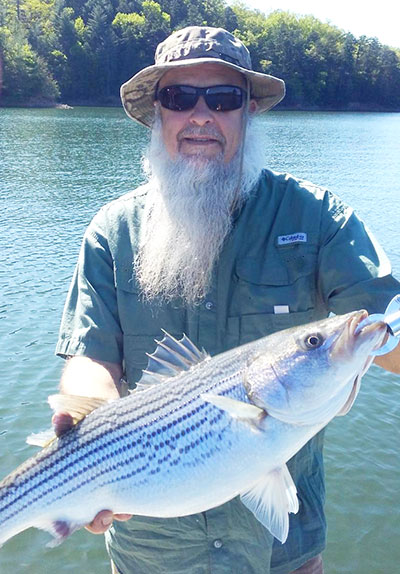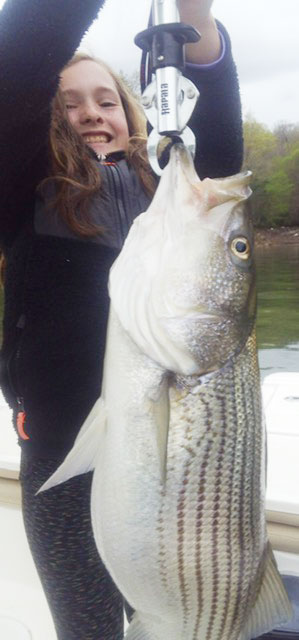The fishing in May has been incredible, and June is setting up to be an awesome month as well. We have been catching a ton of stripers, hybrids, smallmouth, spots, largemouth, crappie, and even some walleye, and I see no reason why June won’t be just as good. As of this writing (early May), I am almost completely booked in June, but the trophy summer smallmouth bite (along with the awesome summer striper bite and solid night time crappie bite) will be wide open in July, so call me now if you want to make sure you get a date. With that said, I would like to spend my time this month looking at something a bit different: the role guides play, or at least should play, in conserving our lake fisheries for the future.
One of the things I love most about our Murphy area lakes, (with the exception of Chatuge), is the relative absence of fishing pressure. However, guides like myself who spend hundreds of days a year on the water have the potential to have a bigger impact on the health of the fisheries than your average angler who goes out on a couple of pretty Saturdays per month. It is simple math: someone in my position, who takes out a few hundred anglers each year, has the mathematical possibility to do a lot more damage than even the lucky hypothetical angler who limits out every day of the year, but only fishes by himself or with a buddy. One of the complaints I hear the most from local anglers, regarding guiding, is the number of fish that guides could potentially allow their clients to keep and the impact of that upon our lakes, and, while there isn’t anything illegal about allowing every single client to keep every legal fish, it is dumb business, and borderline unethical.

In my mind, it boils down to personal responsibility, common sense, and a longer term vision for the future than just how much money I can make in the shortest time possible (I have lost trips and had cancellations when people find out I won’t allow them to keep everything, but quite frankly, I am fine with losing that kind of business). I not only want my clients to experience incredible fishing today, but I want my clients 10 years from now to still be experiencing awesome (and hopefully even better) fishing. As an example, over 1,000 stripers were caught in my boat out of Hiwassee Lake last year, 95% of which were legal size fish. The limit on stripers is 4 per person, and I often ran 4 and 5 person trips. That is potentially 20 stripers a day gone out of the lake. However, there is no way I would ever allow my clients to keep that many stripers, as that overall number is a pretty substantial percentage of the number of stripers stocked yearly anyway. I have a boat limit of 2 per person on my boat, and I also cap the total take in regards to how many can be kept in a day, regardless of the number of anglers on board. Hiwassee has the potential to be a world class trophy striper destination, but they will never grow to be 50 and 60 pounders if all of them have a filet knife ran down their spine when they are 10 pounders. The same holds true for most other species.
The simple fact of the matter is that some fish are going to die in the process of getting caught, whether they are caught by a local guide, tournament ace, or a weekend warrior. Fish mortality can be attributed to a number of factors: poor handling, deep hooking, a filet knife, taking too long to get a picture, dropping them on hot carpet, or getting hauled around in a rough, hot livewell on the way back to a tournament weigh-in. However, common sense practices exercised by all anglers, especially local guides, will go a long way towards insuring the sustainability and even improvement of the quality of our awesome fisheries. Have a great day, and I hope to hear from you soon!
Aaron Kephart is the Owner of Mountain Lakes Guide Service. To book a guided trip on one of the Murphy area mountain lakes, contact him by phone or by email at mtnlakesguide@outlook.com Check out his website at http://www.mtnlakesguideservice.com and catch him on facebook@mountainlakesguideservice
